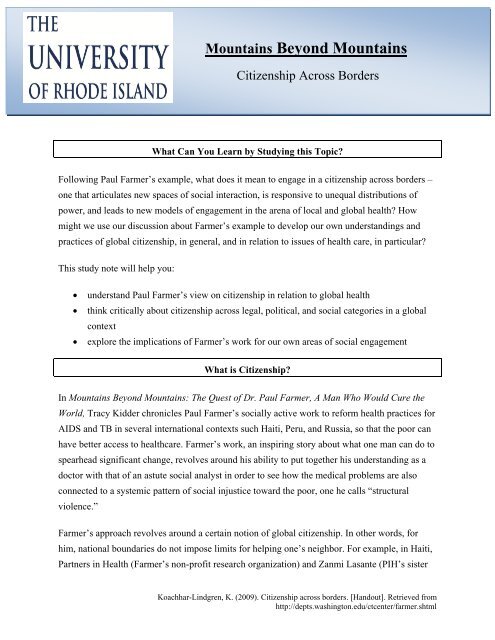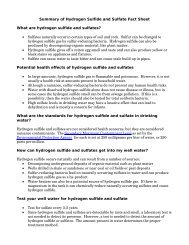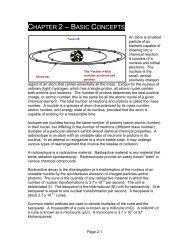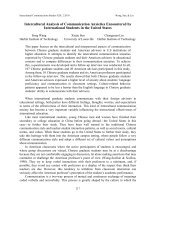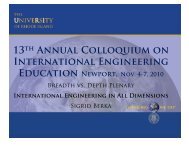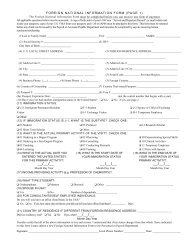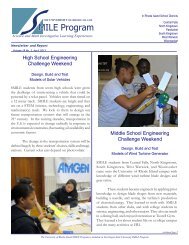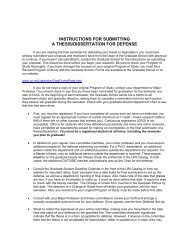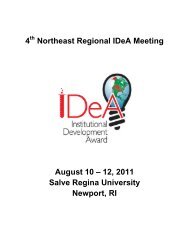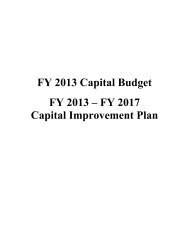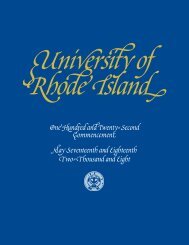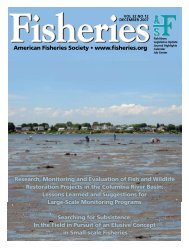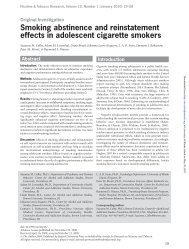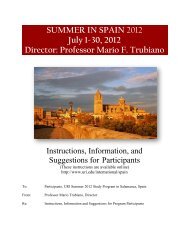Mountains Beyond Mountains
Mountains Beyond Mountains
Mountains Beyond Mountains
- No tags were found...
Create successful ePaper yourself
Turn your PDF publications into a flip-book with our unique Google optimized e-Paper software.
<strong>Mountains</strong> <strong>Beyond</strong> <strong>Mountains</strong>Citizenship Across BordersWhat Can You Learn by Studying this Topic?Following Paul Farmer’s example, what does it mean to engage in a citizenship across borders –one that articulates new spaces of social interaction, is responsive to unequal distributions ofpower, and leads to new models of engagement in the arena of local and global health? Howmight we use our discussion about Farmer’s example to develop our own understandings andpractices of global citizenship, in general, and in relation to issues of health care, in particular?This study note will help you:• understand Paul Farmer’s view on citizenship in relation to global health• think critically about citizenship across legal, political, and social categories in a globalcontext• explore the implications of Farmer’s work for our own areas of social engagementWhat is Citizenship?In <strong>Mountains</strong> <strong>Beyond</strong> <strong>Mountains</strong>: The Quest of Dr. Paul Farmer, A Man Who Would Cure theWorld, Tracy Kidder chronicles Paul Farmer’s socially active work to reform health practices forAIDS and TB in several international contexts such Haiti, Peru, and Russia, so that the poor canhave better access to healthcare. Farmer’s work, an inspiring story about what one man can do tospearhead significant change, revolves around his ability to put together his understanding as adoctor with that of an astute social analyst in order to see how the medical problems are alsoconnected to a systemic pattern of social injustice toward the poor, one he calls “structuralviolence.”Farmer’s approach revolves around a certain notion of global citizenship. In other words, forhim, national boundaries do not impose limits for helping one’s neighbor. For example, in Haiti,Partners in Health (Farmer’s non-profit research organization) and Zanmi Lasante (PIH’s sisterKoachhar-Lindgren, K. (2009). Citizenship across borders. [Handout]. Retrieved fromhttp://depts.washington.edu/ctcenter/farmer.shtml
tuberculosis treatment to save her family from starvation. As Farmer points out, the risk ofacquiring tuberculosis increases in a crowded, poverty-ridden area that encourages the spread ofthe disease. Afterwards, the economic limitations given to Third World nations limit thedistribution of medical services. This situation can increase the spread of disease throughout thepopulation to epidemic proportions. As we see in many of the examples in <strong>Mountains</strong> <strong>Beyond</strong><strong>Mountains</strong>, both the failures of specific governments and international organizations andconstituencies in terms of oppressive sociopolitical structures, poor information flow, and rigidideas about international partnerships maintain the boundaries between the rich and the poor andincrease the likelihood of the health disparities staying in place.Citizenship and Health AllocationTo achieve proper health allocation in a global context, Farmer indicates that certain types ofaction are important. His view stems, in part, from liberation theology which argues for equaldistribution of the world resources among its citizens. The poor citizens of the Third World, heargues, do not enjoy the benefits and services available to the rich or those in industrial countriesbecause of socioeconomic discrimination. Therefore, curbing the spread of disease within ThirdWorld nations requires equal distribution of health resources, as well as a change insocioeconomic perspectives of industrialized nations. Yet, as Farmer’s work shows us, thesechanges will most likely come about one person at a time, one initiative at a time. Developingthe social awareness that can inspire and lead to the process of making personal choices to actand get involved requires an evolving understanding of how we are all part of an internationaldrama.What Does This Topic Mean For You?The analysis of citizenship in connection to health disparities increases one’s comprehension ofwhat it means to be a global citizen. It helps increase one’s critical thinking and perspectives onsocioeconomic policies by wealthy countries toward poorer countries. Also, it serves as a gaugeto discern local, social issues such as homelessness and immigration reform. It is throughstruggling with such topics that we move, however modestly, toward personal and professionalgrowth.Questions for Further StudyKoachhar-Lindgren, K. (2009). Citizenship across borders. [Handout]. Retrieved fromhttp://depts.washington.edu/ctcenter/farmer.shtml
1. In a number of places, Kidder depicts Farmer’s colleagues as people who areexemplary in their work, but are not necessarily mega-stars in the way that Farmeris. What do you think about the way Kidder scrutinizes Farmer and his work andconsiders his approach as a model? Jim Kim, who has worked with Farmer formany years, comments, for example: “ ‘Paul has created technical solutions to helpthe rest of us get to decency, a road map to decency that we can all follow withouttrying to imitate him. …Paul is a model of what should be done. He’s not a modelfor how it has to be done’ ” (244). On the one hand, what’s useful and importantabout articulating the larger-than-life proportions and style of Farmer? On the otherhand, how can a bit of skepticism help us to scale the model of engaged citizenshipso that it better fits our own circumstances?2. What does Farmer want Kidder to hear when he asserts the following: “ ‘Whenothers write about people who live on the edge, who challenge their comfortablelives – and it has happened to me – they usually do it in a way that allows a reader away out. You could render generosity into pathology, commitment into obsession.…I don’t have a lot at stake in how you depict me’ ” (206-7). How does this quotehelp us to understand Farmer’s own ideas about his choices to make an impact?How do you think he might like us to respond?3. On a more personal level, do you have a passport? What does this passport entitleyou to do, or make it difficult for you not to do? What type of global citizen can yoube or not be because of your passport? Does this position impact what types ofchoices you can make as a socially engaged citizen? (How does the fact that Farmeris from the U.S. impact his international mobility?) Does this position impact whathealth services you have access to?4. What are your experiences with the medical system, locally or elsewhere? How dothose experiences parallel some of the stories in Kidder’s book? How do theydiverge? Why and how?5. What are the necessary conditions for a global citizenry that acts in responsibleways toward each other? How can we begin to get to this point?Resources for Further StudyKoachhar-Lindgren, K. (2009). Citizenship across borders. [Handout]. Retrieved fromhttp://depts.washington.edu/ctcenter/farmer.shtml
BooksBriggs, C.L. (2003). Stories in the Time of Cholera: Racial Profiling during a MedicalNightmare. Los Angeles: University of California Press.Kidder, T. (2003). <strong>Mountains</strong> <strong>Beyond</strong> <strong>Mountains</strong>. New York: Random House.Kim, J., Millen, J., Gershman, J., and Irwin, A. (Eds.). (2000). Dying for Growth: GlobalInequality and the Health of the Poor. Maine: Common Courage Press.Farmer, P. (1999). Infections and Inequalities: The Modern Plagues. Berkeley, CA: Universityof California.Farmer, P. (2005). Pathologies of Power: Health, Human Rights, and the New War on the Poor.Berkeley, CA: University of California Press.ArticlesKing, N. (2003). “Immigration, Race and Geographies of Differences in the TuberculosisPandemic.” In M. Gandy and A. Zumla (Eds.), The Return of theWhite Plague: Global Povertyand the ‘New’ Tuberculosis (pp. 39-54). New York: Verso.Millen, J., Irwin, A., and Kim, J. (2000). “Introduction: What is Growing? Who is Dying:” In J.Kim, J. Millen, J. Gershman, and A. Irwin (Eds.), Dying for Growth: Global Inequality and theHealth of the Poor (pp. 3-10). Maine: Common Courage Press.WebsitesBill and Melinda Gates Foundationhttp://www.gatesfoundation.org/Centers for Disease Control and Preventionhttp://www.cdc.govNational Institutes of Healthhttp://www.nih.gov/Koachhar-Lindgren, K. (2009). Citizenship across borders. [Handout]. Retrieved fromhttp://depts.washington.edu/ctcenter/farmer.shtml
Partners In Healthhttp://www.pih.orgRobert Wood Johnson Foundation “Cover the Uninsured Week”http://covertheuninsured.org/United Nationshttp://www.un.orgWorld Health Organizationhttp://www.who.int/en/Koachhar-Lindgren, K. (2009). Citizenship across borders. [Handout]. Retrieved fromhttp://depts.washington.edu/ctcenter/farmer.shtml


